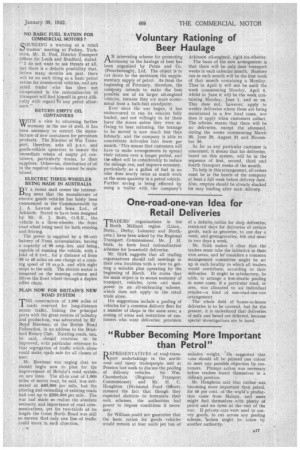NO BASIC FUEL RATION FOR COMMERCIAL MOTORS?
Page 19

If you've noticed an error in this article please click here to report it so we can fix it.
SOUNDLNG a warning at a retail traders' meeting at Pudsey, Yorkshire, Mr. B. Peel, District Transport Officer for Leeds and Bradford, stated: -" I do not want to use threats at all, but there is a definite possibility that, before many months are past, there will be no such thing as a basic petrol ration for commercial vehicles, and any retail trader who has then not co-operated in the rationalization of transport will find himself in great difficulty with regard to any petrol allowance."
RETURN EMPTY OIL CONTAINERS ty/ITH a view to obtaining further VY economy in the use of steel, it has been necessary to restrict the manufacture of new containers for petroleum products. The Minister of War Transport, therefore, asks all p.s.v. and goods-vehicle operators to ensure the immediate return of empty pit containers, particularly drums, to their suppliers. Otherwise, distribution of oil in the required volume cannot be maintained.
ELECTRIC THREE-WHEELER BEING MADE IN AUSTRALIA
BY a recent mail comes the interesting news that the manufacture of electric goods vehicles has lately been commenced in the Commonwealth by J. A. Lawton and Sons, Ltd., of Adelaide. Stated to have been designed by Mr. E. J. Both, 0.B.E., the vehicle is a three-wheeler, the front road wheel being `used for both steering. and driving.
The power is supplied by a 96-volt battery of -Vesta accumulators, having a capacity of 90 amp.-hrs. and being. capable of running the vehicle, with a load of S cwt., for a distance of from 30 to 40 miles on one charge at a cruising speed of 18 m.p.h. and With eight stops to the mile. The electric motor is mounted on the steering column and drives the front wheel through a duplex roller chain.
PLAN NOW FOR BRITAIN'S NEW ROAD SYSTEM
THE construction of 1,000 miles of roads reserved for long-distance motor traffic, linking the principal ports with the great centres of industry and production, was advocated by Mr. Boyd Bowman, of the British Road Federation, in an address to the Bradford Rotary Club. Existing roads, too. he said, should continue to be improved, with particular reference to that segregation of traffic which alone could make roads safe for all classes of user.
Mr. Bowman was urging that we should begin now to plan for the improvement of Britain's road system. on new lines. The all-in cost of 1,000 miles of motor road, he said, was estimated at £60,000 per mile, but the altering and extending of existing roads had cost up to 2200,000 per mile. The war had made us realize the absolute necessity and importance of road cammunications, yet for two-thirds of its length the Great North Road was still so narrow that only one line of traffic could move in each direction.




















































